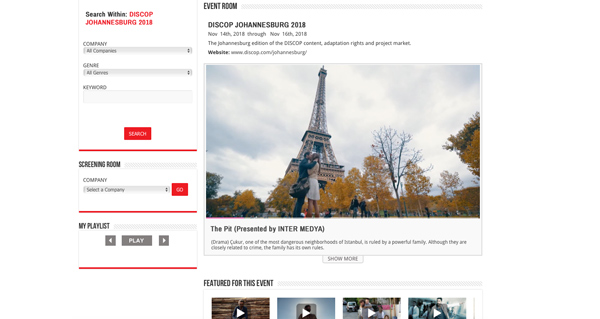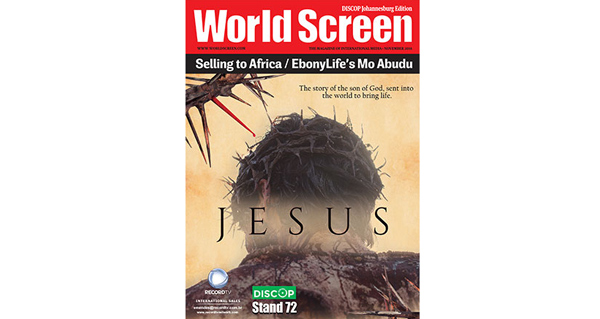The African media landscape is reaching new heights, creating a range of opportunities for distributors.
By all accounts, the television market in Africa is booming. Basic Lead, which organizes the DISCOP markets, hosts three events focused on the industry in the region, and that alone is an indication of the flurry of activity in the space. DISCOP Johannesburg this year is zeroing in on changes in Africa, including the emergence of a mobile-based B2C content distribution marketplace, international co-productions, and regional production and distribution partnerships among neighboring countries.
“Our business in Africa continues to flourish with established relationships thriving alongside the emergence of new business opportunities,” says Robin Pollok, Endemol Shine International’s (ESI) sales director for Africa, the Middle East and Israel. “This year, we have already sold over 850 hours of finished tape hailing from a variety of countries and a broad spectrum of genres. The African TV marketplace is thriving, particularly the pay-TV market.”
According to Digital TV Research, there will be some 10 million SVOD subscribers across sub-Saharan Africa by 2023, up from 1.6 million at the end of last year. Yet, revenues will reach just $775 million. South Africa is projected to have the largest subscriber base by 2023 with 3.4 million, followed by Nigeria with 2.6 million. As far as platforms go, Netflix will be number one, rising to 4 million by 2023. Showmax will come in second with a projected 1.7 million.
And what are these current subscribers and future customers watching? Channels and platforms are stacking their lineups with scripted dramas.
Indeed, it seems that drama is in high demand across the continent, with Kingdom and Humans scheduled in weekday prime-time slots on free-to-air channels, Pollok reports. Other ESI dramas that are faring well in the region include Gunpowder and The Good Karma Hospital. He says these titles are “swiftly finding partners on both linear and OTT providers.”
INTERNATIONAL FLAIR
“Premium British drama has been a driving force behind sales in recent years,” Pollok adds. “Peaky Blinders and Grantchester have both returned season on season to the BBC and ITV, respectively, and the 2018 drama The Woman in White will be on African screens this November with the BBC.”
Belinda Wango, Calinos Entertainment’s sales representative for Africa, has found that female- and family-oriented dramas do particularly well. “The African culture is very interested in family- and strong female character-driven stories,” she says. “This is why our titles work very well. They represent the struggles of everyday life and the empowerment of the audience. Turkish drama content resonates, and audiences can relate well to the stories.”
Popular female-focused titles include Our Story and Woman. “We have licensed one of our most sought-after titles, The Girl Named Feriha, in Kenya, Ethiopia and South Africa recently while also continuing discussions for other titles,” Wango adds. “We are very happy to be present in these countries.”
Roxanne J. Barcelona, the VP of GMA Worldwide, has found that “the market prefers straightforward dramas and melodramas over romantic comedies or fantasy series.” Thus, sales for My Destiny and My Faithful Husband have been recorded in Nigeria, Ghana, Kenya and Zambia; Beautiful Strangers has sold into Nigeria, Kenya and Zambia; and Until We Meet Again has been acquired in Nigeria and Kenya.
She adds, “Our business in Africa is steady, and it is one of our fastest-growing markets. To date, we have licensed more than 2,000 hours of content in this region.”
Debkumar Dasgupta, the senior VP of international business and syndication at Viacom18/Indiacast, says the company’s dramas “encapsulate social messages that are relevant to most cultures across Africa.” Some of the titles that are doing well in syndication are The Young Bride (Balika Vadhu), Second Hand (Uttaran), The Serpent (Naagin) and Endless Love (Beintehaa).
“Our African clients prefer dramas in prime time,” he adds. “Our shows are imbued with human emotions and have a universal appeal that spans geographies and cultures. Socially relevant dramas are much appreciated by local audiences.”
Brazil’s Record TV has established a strong business in Africa for many years now, according to Delmar Andrade, the company’s international sales director. “We have been providing content to this territory for a long time, and in our expansion plan we have achieved more success than expected in Africa; our products are on the main TV channels of countries such as Angola, Mozambique, Nigeria and Kenya. The demand for our products is very strong in the region.”
The Brazilian broadcaster has become particularly adept at delivering biblical stories, licensing properties such as Moses and the Ten Commandments into the continent and most recently introducing the epic series Jesus.
ENTERTAIN ME
Viewers across the continent don’t just have an appetite for drama alone. Pollok of ESI reports that entertainment formats, including Pointless, Deal or No Deal and Beat Shazam, are also a hot commodity in Africa.
Other top sellers include cooking formats such as My Kitchen Rules. Pollok describes it as an “immensely popular format worldwide and one that is doing well in Africa.” He adds, “The Australian version returns year after year, while the South African version on M-Net is also a ratings success. My Kitchen Rules South Africa season two has delivered consistently impressive ratings even when up against the World Cup this summer.”
He believes that “putting ordinary people cooking in their domestic environment front and center makes My Kitchen Rules both relatable and aspirational, not to mention the universal appeal of good-looking plates of food.”
ESI has also had success with MasterChef Australia and MasterChef Junior USA. “Our cookery brands are as popular in Africa as they are in the rest of the world,” Pollok says.
Alongside titles that put a spotlight on cooking prowess, African viewers are clamoring for talent shows like So You Think You Can Dance. “We have also recently concluded a 48-title factual-entertainment package deal for a new channel that will be launching later this year,” he adds.
And the appetite for TV entertainment spans the continent, as GMA’s Barcelona reports that the company has regular clients from Nigeria, Uganda and Kenya, and is also seeing growth opportunities in Zambia, Ghana, Tanzania and Botswana. “There are still many countries that we have not penetrated, and we hope that through DISCOP we can meet more African buyers,” she says.
“South Africa is, of course, a traditional driver of pan-African sales,” ESI’s Pollok notes. “However, increasingly, we have also been in discussions with operators from single-nation markets, including Nigeria, Kenya and Botswana.”
For Calinos, Eastern and Western Africa have proven to be strong buyers, and now opportunities for the distributor are emerging in Central African countries. Meanwhile, Viacom18/Indiacast has seen activity in Southern Africa, Mauritius, Kenya, Uganda, Tanzania, Nigeria and Ghana. “We have now started exploring markets in North and West Africa, including the Arabic- and French-speaking territories,” Dasgupta says.
Syndication represents a robust business opportunity for Viacom18/Indiacast. “We have been growing our syndication business at a very fast pace, and it is one of the strongest growth stories that we have,” says Dasgupta. “We now syndicate our content to over 25 African countries across three languages dubbed or subtitled in English or the local language.”
Dasgupta adds, “We are exploring [opportunities] with a few digital platforms, but it seems the business will take time, as data consumption is low and expensive in most countries.”
NEW WATERS
ESI’s Pollok notes, “We have sold content to nonlinear platforms in Africa for a few years now, and these nonlinear platforms have become a vital part of our business in the region. One major development we have seen from local platforms is an increase in requests for complete exclusivity over titles.” For example, Younger is an exclusive offering for Showmax in the territory.
“The expansion of SVOD in Africa seems set to be the greatest future opportunity for content distribution in the region,” explains Pollok. “While there are an estimated 486 million smartphone users [projected for 2022] in sub-Saharan Africa, streaming is currently limited by data costs that remain prohibitively expensive for many consumers.” Though projected increases in SVOD subscribers and revenues “represent not only an opportunity for both the development of existing platforms and the emergence of new platforms, but also for those distributors selling their content on the continent,” he adds.
As the digital market matures, Calinos continues to focus on linear sales in Africa and hopes to extend to nonlinear platforms as well.
Alongside the promise of growth, with a developing market like Africa there are some financial concerns for content distributors as well.
UPHILL CLIMB
“As our clients only accept English-dubbed masters, we have to manage and balance the costs of dubbing in order to be able to generate profit,” says GMA’s Barcelona.
Another challenge, according to Barcelona, is being able to “continuously gain a better understanding of the market’s preference through audience measurement.”
Dasgupta of Viacom18/Indiacast reports that the “fluctuation of the local currency against the U.S. dollar has impacted deal value hugely and clients are facing remittance issues in their individual countries.”
“The African market is tremendously diverse and, as such, a one-size-fits-all attitude to deal-making does not work,” Pollok of ESI explains. Instead, it is key to “negotiate tailor-made packages that cater to local requirements and expectations.”
Even with the inherent challenges of the African market, Dasgupta expects Viacom18/Indiacast to “increase our already strong footprint across Africa and create stronger and more meaningful partnerships with our existing clients and newer prospects.”
Record TV’s Andrade adds, “This region is an extremely important part of [our] plan to disseminate and consecrate our productions around the world.”
 TVMEA
TVMEA




